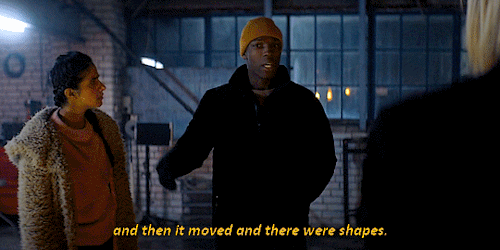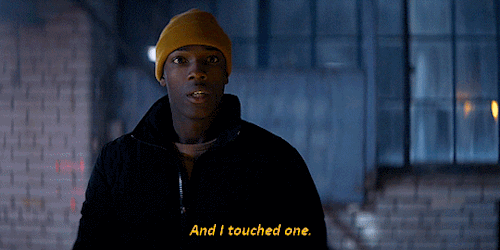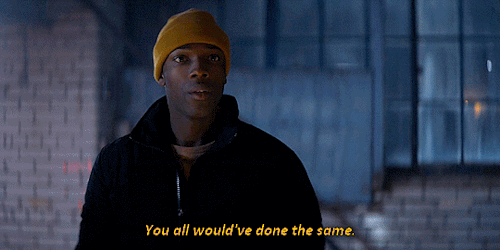#the woman who fell to earth
I wonder if the Stenzas are part of Chris Chibnall’s policies for more LGBT diversity.
After all, can’t get a Stanza without vers
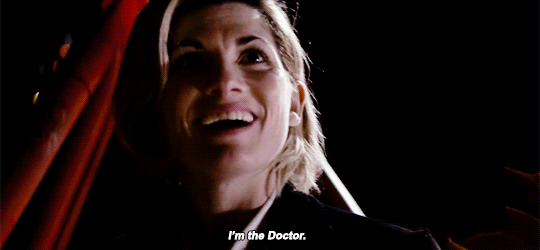
It feels like I’ve been waiting ages for this. And finally, she’s here. And she was brilliant.
Doctor Who made an exuberant return to our screens with a new showrunner, an almost entirely new creative team, and — for the first time in the show’s historic 55 year run — a woman as the new Doctor. “The Woman Who Fell to Earth” was a busy episode with an impossibly long list of introductions to make, and yet it managed to welcome the Doctor’s new “fam” in a story filled with horror, humor, and plenty of heart.
I won’t lie — I neededthis episode to be good. After fighting for a woman to be the Doctor for so hard and for so long, I don’t think I could’ve handled the heartbreak if it had been subpar. It’s not really fair that TV shows and movies with women leads are held to such impossibly high standards, but that’s the unfortunate side-effect of sidelining women for so long and featuring them in the lead role so infrequently. Our hopes and expectations are so high precisely because we have such limited opportunities. Thankfully, “The Woman Who Fell to Earth” met and even outperformed our expectations. The very few trolls who are still harassing supportive fans were drowned out by the overwhelmingly positive response to Whittaker and her new friends, and the ratings went through the roof. Whittaker has utterly captured the fandom, and more importantly, she’s brought in an entirely new generation of fans.
Nevertheless, you could practically feel the tension about the Doctor being a woman running through the episode. The Doctor herself was notably unbothered by the change, simply asking “Does it suit me?” (God, yes it does). But her final monologue was squarely aimed at the audience:
Because we’re all capable of the most incredible change. We can evolve while still staying true to who we are. We can honor who we’ve been and choose who we want to be next.
This is a final Hail Mary throw to the fans who were still unconvinced. Each Doctor is new and different from the one who came before, building and changing and evolving the character over the decades. This is just another evolution — grounded in the show’s deep history but looking forward and beginning to embrace the character’s full potential. It’s a deliberate choice to embrace the future, instead of remaining stagnant and trapped in the past.
Jodie Whittaker knew the importance of the role she took on, and she performed it brilliantly. It’s always difficult to judge a new Doctor in their first episode, since they are supposed to be a bit unbalanced and chaotic post-regeneration. But even when the Doctor didn’t quite have a grip on who they are, Whittaker was a force to watch, attacking every new scene with an unquenchable energy that was utterly captivating. She captured the Doctor’s earnest, childlike joy just as easily as she assumed the Doctor’s strident anger.
It’s incredible that Whittaker didn’t extensively watch Doctor Who before assuming the role, because there’s echoes of so many previous Doctors in her own performance, from Patrick Troughton’s physical humor to David Tennant’s hectic energy. Between the out-of-commission TARDIS, the big new family, and the cobbled together bits of Earth and alien tech, I was even getting a Pertwee-ish vibe from this story. But the Thirteenth Doctor is clearly stamping out her own personality. When the Third Doctor would’ve tried to escape Earth, she lingered. Where the Tenth Doctor would have gotten carried away, she focused.
The moment I truly fell in love with her was when, frustrated by her inability to get anything done without her sonic screwdriver, she decided to go ahead and build one herself. It’s been alluded to before that the Doctor has made their own sonic, but this is the first time we’ve ever seen them do it onscreen (the last two Doctors had theirs magically supplied by the TARDIS). That sequence, set to Segun Akionla’s gorgeous score, is going to be iconic. This is a Doctor who is going to do things on her terms and build it her own damn self.
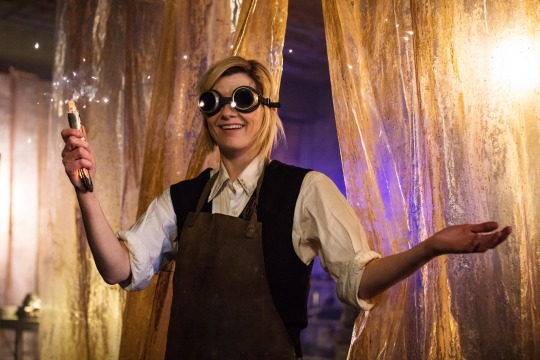
But the Doctor can’t do everything on her own, and her new friends show quite a lot of potential. Yaz was given the least attention this episode, but I have a feeling she’s going to be the one to watch. She’s driven, ambitious, and ready to run into danger — perfect companion material. But Yaz is a cop, and she’s used to being in a position of authority in dangerous situations. We’ve already seen her clash with the Thirteenth Doctor over who will be in charge, and I have a feeling that we haven’t seen the end of that conflict.
Ryan was the true heart of this story. He’s earnest and sweet, even if he has his moments of explosive frustration. He’s also curious and open to believing some of the more incredible things that the Doctor says. Together, Yaz and Ryan balance each other perfectly. Yaz pulls Ryan into trying new and dangerous things, and Ryan encourages Yaz to be more open to accepting that the world is a bit wilder than she could’ve possibly imagined.
I’m still warming up to Graham. He had a few comedic moments, and his relationship with Grace was adorable, but on his own he’s a little bit harder to handle. He was prickly with Ryan in a way that was uncomfortable to watch; I actually cringed when he suggested Ryan would blame his mistake granting access to the Stenza on his disability. He’s also more inclined to leave a dangerous situation, which doesn’t make him a natural candidate to be a companion. I’m curious if his character will grow or change at all while traveling with the Doctor.
Representation was a quiet focus of this story. In addition to the first woman Doctor, we had three POC lead characters, a diverse supporting cast, an interracial relationship, a nontraditional family unit, and a character with a disability. And none of these was a huge deal, it was simply reflective of the world in which we — and these fictional characters — inhabit.
Doctor Who has had a mixed record of handling disability, but I was pleasantly surprised by how well Ryan’s dyspraxia was handled. It wasn’t magically caused by aliens and wasn’t miraculously cured by the end of the episode. It wasn’t the key to solving the issue at hand, but it didn’t limit Ryan from being a hero either. It introduced the disability to thousands of viewers without stigma or shame, and since the episode aired the internet has been filled with thrilled responses from people with dyspraxia.
But there was one major failure in this story — Grace’s death.
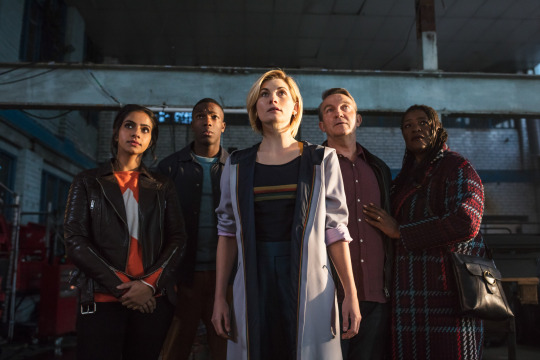
Of all the Doctor’s new friends, Grace was the most suited to being the Doctor’s companion. She wasn’t afraid to run towards danger — in fact, she loved every moment of it. She kept her eye on the bigger picture and always asked the right questions. And she kept everyone in check, including the Doctor (and that’s no small task). She would’ve loved every moment of adventure in the TARDIS. Instead, she was summarily killed off just as her adventure was getting started.
I was following the conversation on Twitter during the simulcast premiere. While everyone was sad at Grace’s untimely death, the disappointment was particularly pronounced amongst black women. I highly encourage everyone to read Tai Gooden’s review in Hypable and listen to the TARBIS (Time and Relative Blackness in Space) podcast’s response to hear directly from black women and understand why they were so hurt by Grace’s death.
In my mind, Grace’s death is absolutely an example of fridging —a death created for the sole purpose of causing Ryan and Graham grief and propelling their characters forward. Her final words were to encourage Graham not to be afraid without her. Ryan’s YouTube commentary, where he grieves over her death, anchors the beginning and end of the story. And given that Ryan and Graham never got along well on their own, Grace’s death will almost certainly be a recurring theme between them now that they’re trapped in space together. It was such an unnecessary waste of a fascinating and vibrant character. For a story that was so intensely focused on presenting an inclusive and progressive visionofDoctor Who, fridging a black woman in the very first episode was an egregious betrayal.
The one caveat here is that Grace was described in early press releases as a “returning character,” which seems to imply that she will be in future episodes. I suspect that she’ll be seen in flashbacks, or that the TARDIS team will travel back in time and see her at an earlier point in her life (or it was a deliberate misdirection and Grace won’t be seen again). But it is possible that Grace’s death will somehow be reversed. I would appreciate that. However, bringing Grace back to life won’t erase the damage that’s been done. Her death will still have been used to motivate Ryan and Graham. And it will still have been a disappointing moment in what should have been a fresh start for weary fans.


